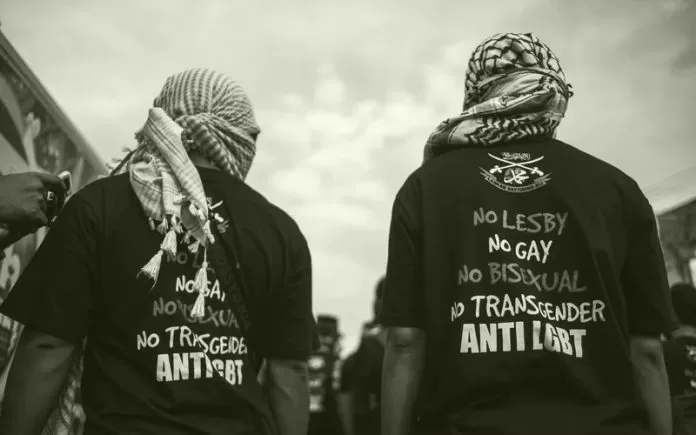(Originally published in Time)
[dropcap]A[/dropcap] new report by Human Rights Watch has found that persecution against lesbian, gay, bisexual, and transgender communities in Indonesia – the world’s largest Muslim democracy – is fueling a public health crisis and contributing to the spread of HIV.
Since 2016, police raids and arrests at private spaces such as clubs, saunas and salons have increased, alongside anti-LGBT rhetoric from government officials and state spokespersons. The raids and state-led hostility poses a fundamental challenge to HIV outreach workers, who use these venues as safe spaces to carry out their work with LGBT communities through education programs on prevention and transmission, counseling support services and distribution of condoms and HIV testing kits.
Kyle Knight, an LGBT rights researcher at Human Rights Watch and author of the aforementioned report notes that such raids by the government and police have normalized hateful behavior and actions against LGBT people. Knight reiterates the importance of viewing the issue from not only a human rights perspective, but also from a public health perspective. “There is a need to create safe spaces for those to gather and gain information, to receive safety, sense of dignity, community and privacy.”
HIV rates among gay men in Indonesia have increased give-fold from 5% in 2007 to 25% in 2015, according to government and UNAIDS data. Outreach workers and human rights observers worry that without access to education and other services, which are exacerbated by spiraling anti-LGBT rhetoric, the HIV epidemic among gay Indonesian men will become increasingly worse.
Dede Oetomo is an activist and founder of gay rights group Gaya Nusantara who has spearheaded Indonesia’s gay rights movement for over 30 years. In an interview with Time, he shares the ways in which changes in Indonesia’s environment for LGBT people have affected the way he carries out his work. “Starting with democratization in 1998, that gave us hope that we could do our activities in the democratic way, to demand change and legislation. Just this morning I saw an old newspaper article that was from 10 years ago, when were able to do a national training for activists in the open. There were no secrets about it,” he says, Dede expanded on the struggles to advocate and publicise their training and programs, where things were reduced to smaller scale events over the fear of being stopped by Islamist groups. The organization has had some of its campaigns and events cancelled and reported to the police.
A nationwide anti-LGBT “moral panic” is making outreach to these vulnerable populations much harder, HRW found, making the spread of the disease more likely. According to the report, only 50% of gay men have ever tested for HIV and out of those infected and in need of antiretroviral drugs, only 9% are currently taking the medication.
With the recent provincial elections and ahead of presidential elections next year, observers say the issue is being used to score political points. A proposed revision to the country’s criminal code that would outlaw same sex relations and sex outside marriage has been under debate since January, and was condemned by the U.N. High Commissioner for Human Rights as “inherently discriminatory.” Currently, the ultra-conservative Aceh province is the only part of Indonesia where consensual same-sex relationships are illegal.
“Politicians are trying to use moral issues to get votes from the general public for the governor, mayoral elections, and president,” says Ignatius Praptoraharjo, a researcher at the Center for HIV and AIDS research, Atma Jaya University of Jakarta. Combined with the crackdown and heightened discrimination against LGBT people, the impending health crisis threatens to force the community into total retreat. As Knight have put it, “the LGBT community in Indonesia has undergone a complete character assassination. Fundamental shifts have left people concerned and completely anxious about what’s to come.”



